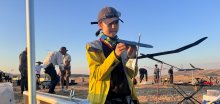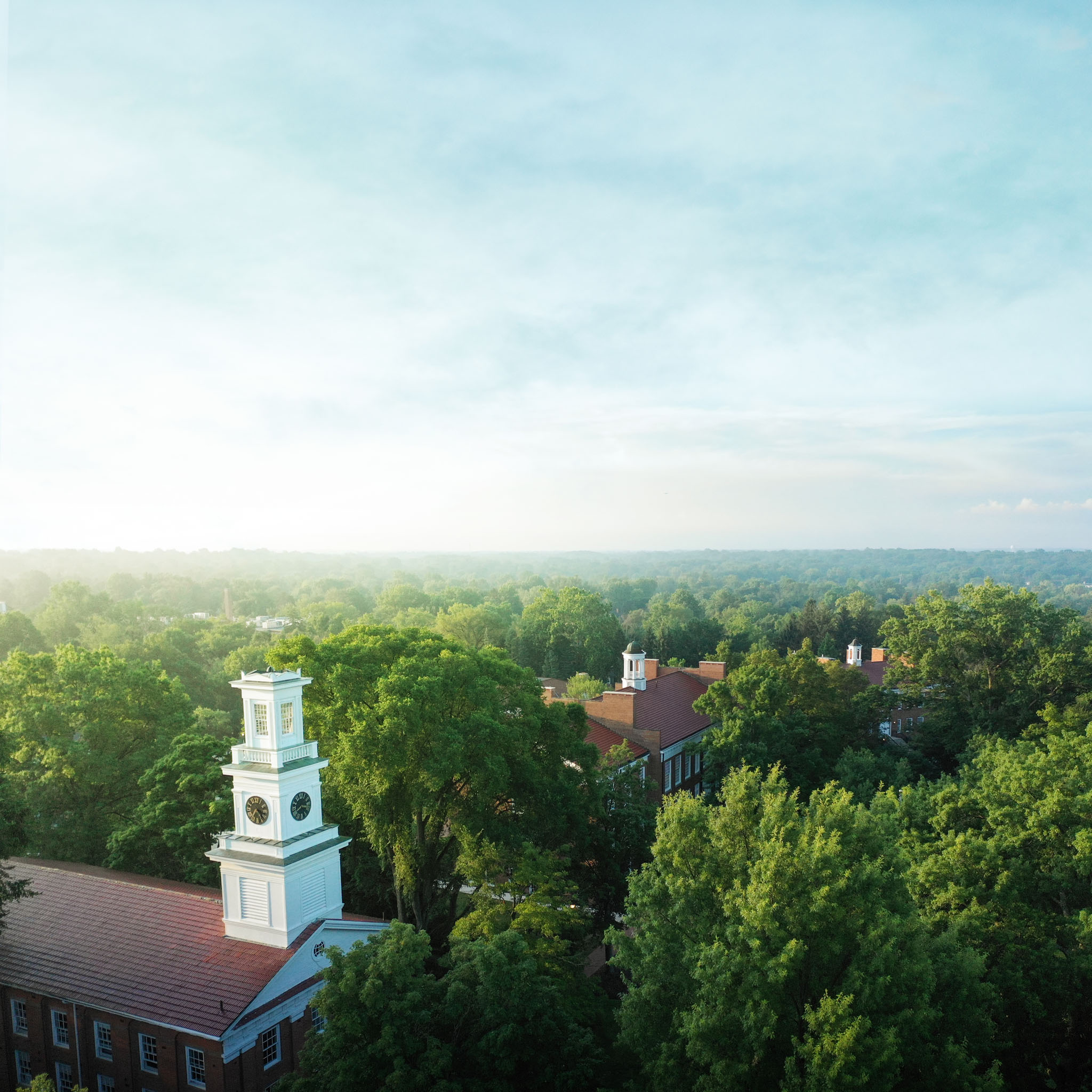
.jpeg) Only a sophomore, Tia Zheng ’27 is already a high flyer. This past February, she traveled all the way to Lost Hills, California to compete in a series of outdoor free flight events, with a showing so impressive that she was named the Top Junior in the 2024 World F1 Free Flight F1B category by the Aeromodeling Commission.
Only a sophomore, Tia Zheng ’27 is already a high flyer. This past February, she traveled all the way to Lost Hills, California to compete in a series of outdoor free flight events, with a showing so impressive that she was named the Top Junior in the 2024 World F1 Free Flight F1B category by the Aeromodeling Commission.
In the world of aeromodeling, the free flight model airplanes are designed to fly without any external control after launch. At these competitions, athletes are competing for the longest total flight duration achieved over a set number of flights, with the stopwatch as the only judge of success. Once launched in the air, these planes follow the wind and rising thermal currents of warm air, having been modified by the competitors based on a number of factors — temperature, wind and more.
“We adjust pre-made model airplanes, modifying the design to fit our needs,” explained Tia. “I’ll work with my coach to change parts and adjust parts of the model, such as the degree of the wing or the tail, to make it the best glider for thermal, wind or weather conditions.”
If you have ever thrown a folded paper airplane, then you have flown a free flight model in its simplest state. Free flight is the oldest form of aeromodeling, the OG of heavier-than-air aviation. It dates back to 1871 when French inventor and aviation pioneer Alfonse Pénaud launched his rubber-powered Planophore in the Tuileries Gardens in Paris. 150+ years later and much has changed since that original 11-second flight, and now, a new Pioneer is making her own mark on the sport.
Not long after Tia received global recognition, she was tapped to join the 2024 USA Junior Outdoor Free Flight Team. A nine-person assembly, with four athletes competing in the F1B category (including Tia), they traveled all the way to Prilep, North Macedonia in the Balkans for the Junior Free Flight World Championships this past August. After an intense week of competition, the results were astounding. Team USA earned team gold in the F1B category, the same category that Tia had competed in, and Tia won third place in the overall F1B female category.
Perhaps even more astounding — this is only the fourth competition that Tia has attended.
“I only started competing in free flight about two years ago,” she explained. She named her father, Yanlin Guo, as the one responsible for sparking her interest in the sport he also participated in at a young age. “I think he always hoped his child would get into it as well. That worked out well for him,” she joked.
Her first foray into the field was remote-controlled flight, at which she excelled profoundly, rising to national championship levels in China, her home country. She could have continued down this successful trajectory, but she boldly charted a new path.
“I wanted to try something else — and I tried free flight, and I knew immediately that it was totally my thing,” said Tia. “It’s so fun.”
A competition like this requires a mind for mathematics and physics, plus physical strength and endurance (it requires between 100 - 400 turns to wind the model plane to prepare it for launch at these competitions). You can imagine that someone might point to these high-intensity moments, the thrill and satisfaction of correct calculations, as the reason the sport is so exhilarating. But Tia’s explanation was surprising, revealing a quiet and introspective mind, an eye for beauty and wonder.
“Our competitions normally begin at seven in the morning, and you have to get there two hours prior,” she described. “So you’ll wake up at four in the morning, just so you can arrive at five and give yourself enough time to test your flights, to set up and prepare everything you’ll need, and to make your adjustments to the planes. But what that means is that I’ve seen so many sunrises.”
She explained that the competitions can last long into the afternoon, and if you qualify for finals, you might stay until six, seven or even eight o’clock in the evening.
“Which means I get to see a lot of sunsets as well,” she said. “I feel like free flight has brought me to a lot of different places. I see the stars. I see the sun. I see beautiful sunrises and sunsets. And the competitions require large spaces, with nothing inside the competition area. I tend to see a lot of mountains, fields of grass and flowers. Of course, sometimes we have to retrieve our planes when they land, so I’ve gone down into ditches, crossed rivers and streams, visited flocks of sheep and cows.”
.jpeg) Five days before Team USA left for Macedonia, Tia officially met her teammates, who she knew were already close. It was a fast introduction, one she remembers was filled with nerves.
Five days before Team USA left for Macedonia, Tia officially met her teammates, who she knew were already close. It was a fast introduction, one she remembers was filled with nerves.
“I’m actually a pretty introverted person,” said Tia. “I was pretty anxious not only about meeting everyone for the first time, but also about competing. I just didn’t want to let my team down.”
There were other stressors, as well. Five days before the competition, Tia and one of her coaches, Xinpu Sheng, decided to change her method of manually winding — adding turns to the motor (with a maximum of 400 turns), to release the model to the air. Before, she would hold it steady with an arm extended (when she demonstrates this, it almost looks like she’s fishing, reeling in a mighty catch). It’s an exhausting position to hold, and having to do this seven different times was a daunting task. And if you blow up a motor — a normal occurrence, we’re told — you have to do it again. And so they pivoted, adding a belt to her gear to hook the winder to, helping her prop up the equipment and alleviate the weight.
“It was boiling that day during the competition,” she explained. “It was the hottest day of the entire week that we were there. And when it’s hot, you have to put cold water on your motor to keep it cold. We put wet cloths on top of our planes to make sure they wouldn’t overheat. And we also have to cool ourselves down as well!”
As temperatures climbed and hours passed, Tia tried to keep an eye on her progress in all of the hustle of competition, noticing almost as an afterthought that she was continuously maxing her rounds, her plane maintaining flight for the required three minutes of airtime. At the fifth round, she wondered — am I going to the final? Wait, that is so cool! If I’m going to the final, that means I’ll place in the top ten!
But in round six, she missed the three minute window, just shy by seven seconds.
“I was just so down,” she admitted. “I had done so well that day, but I thought I had missed the window by only seven seconds.”
But good news arrived in a chaotic yet thrilling moment, when a staff member stepped up to Tia, holding a certificate with her Chinese name written across it, and asked how to properly pronounce her name.
“I looked down, and I couldn’t believe it,” she said. “I was like, ‘Wait, is this mine? I’m third??’ I was so surprised!”
Earning third place in her category at a world competition is a badge of honor few can carry, but what Tia remembers most clearly about that day is the uplifting experience of being on such a supportive team, and discovering — very quickly — just how much of an impact a great team can make.
On the day of the competition, when Tia began her first wind, she found herself surrounded by her teammates. Questions came in, sprinkled over her like confetti. Tia, do you need this? OK, let me get that for you. Your thing fell off! I’ll put it back on for you. Do you need water? You’ve got this.
“We shared everything,” she explained. “Our equipment, our ice, our water, our food. We helped each other with everything. And I felt like I finally understood the word ‘teammate.’ It’s a little different from the word ‘friend.’ We’re fighting for the same goal. We’re here for the same reason. And we have each other’s back. On the field, none of the families or parents can help you. It’s only your coach or your teammate. And of course, the coaches are busy! So we have to help each other. Be each other’s coaches. We’re like a family.”
.jpeg) Looking back at the timeline of success, it is eye-opening to remember that all Tia has accomplished, she achieved before her sophomore year. Last February, she was a young freshman, walking into the Academic Office to talk to the Associate Head of School about missing two weeks of school for this competition in California — well into the start of the second semester.
Looking back at the timeline of success, it is eye-opening to remember that all Tia has accomplished, she achieved before her sophomore year. Last February, she was a young freshman, walking into the Academic Office to talk to the Associate Head of School about missing two weeks of school for this competition in California — well into the start of the second semester.
“Ms. Petersen was so nice,” she recalled. “I told her about the sport, and we talked about how I would be away during a pretty busy time of year. But she understood how important it was to me, and she said that she’d have a discussion with my teachers to see what the best options would be.”
Tia remembers talking to her teachers later that week, anxious to make sure they understood that she would work hard to keep from falling behind. Academics are important to her, and she takes pride in the hard work she puts into all of her subjects.
“I just remember how supportive they were,” she said with a huge smile. “They kept saying how it sounded like such a great opportunity for me. And when I asked about my homework, they assured me that they would come up with a plan for me. All of my assignments would be on Canvas, and they would provide me with lessons and resources so that I could keep up with the class.”
.jpeg) When she returned to campus, Tia was relieved to find that she hadn’t fallen behind — in fact, thanks to her teachers’ extra support, it felt like there hadn’t been a gap at all. And her successful return home was made all the better by the congratulations she received from all of her teachers, who had been cheering her on from afar.
When she returned to campus, Tia was relieved to find that she hadn’t fallen behind — in fact, thanks to her teachers’ extra support, it felt like there hadn’t been a gap at all. And her successful return home was made all the better by the congratulations she received from all of her teachers, who had been cheering her on from afar.
“I feel so supported by the school,” said Tia. “I don’t know if I would have done so well academically without their help and understanding. I wouldn’t have gotten this chance to go to the World Cup. I wouldn’t be on the junior team. It all felt possible, because of this community.”
There are three people to whom Tia owes a great deal of gratitude — and she took the opportunity at her interview for this story to name them and thank them for all they have done to help her reach such heights. First, and most appropriately, the man who introduced her to the sport — her father.
“I want to also thank Jackie [Wang] and Sheng,” she said, naming two of her free-flying mentors. “There’s a word in Chinese — and it sort of combines teacher, parent, family. They’re like my parents in my air modeling career. They compete as well and keep a very busy schedule, but they still flew all the way out to support me. I just wanted to thank them and my dad.”
The mission of Western Reserve Academy is to prepare students to blaze trails in learning and in life, but sometimes, our students are already doing just that. Watching Tia achieve so much is like watching a paper plane take flight and reach unexpected heights — magical and inspiring. We will be cheering from afar as she travels to compete in the qualifying tournament for the 2025 Free Flight World Championship this October.
Congratulations, Tia!





















